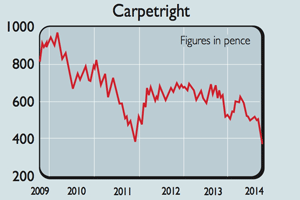Gamble of the week: A risky punt on carpets
If this carpet retailer can get its costs down, the shares could be worth a risky punt, says Phil Oakley.
Get the latest financial news, insights and expert analysis from our award-winning MoneyWeek team, to help you understand what really matters when it comes to your finances.
You are now subscribed
Your newsletter sign-up was successful
Want to add more newsletters?

Twice daily
MoneyWeek
Get the latest financial news, insights and expert analysis from our award-winning MoneyWeek team, to help you understand what really matters when it comes to your finances.

Four times a week
Look After My Bills
Sign up to our free money-saving newsletter, filled with the latest news and expert advice to help you find the best tips and deals for managing your bills. Start saving today!
If you are thinking of buying shares in the UK's largest seller of carpets, then virtually everything you hear or read about the company right now is telling you to steer well clear.
Selling carpets is a cut-throat business. Customers are always looking for a deal and plenty of sellers seem willing to cut prices to give them what they want. This makes it hard to keep your head above water when you have to carry the costs of renting stores and the staff that work in them.
Rival Allied Carpets went bust three times in three years before someone bought the remaining scraps of it in 2012.
MoneyWeek
Subscribe to MoneyWeek today and get your first six magazine issues absolutely FREE

Sign up to Money Morning
Don't miss the latest investment and personal finances news, market analysis, plus money-saving tips with our free twice-daily newsletter
Don't miss the latest investment and personal finances news, market analysis, plus money-saving tips with our free twice-daily newsletter
Carpetright (LSE: CPR), however, has survived and has a sizeable 25% share of the £1.5bn UK market. Yet, this business has so many red warning flags flying from it, it's not really surprising that lots of people are betting that the shares still have a long way to fall from their current 52-week low of 373p.
Last year, the chief executive walked out of the business. This year, the company's founder, Lord Harris of Peckham, has announced that he is planning on leaving and has been selling quite a lot of his family's shares recently shifting over £13m worth a couple of years ago. A venture into Europe has not paid off and is losing money.
What's more, profits have fallen a long way. Back in 2010, its trading profits were £34.1m and its operating margin was 6.6%. A decade ago, profit margins were in the low teens. Not looking good when you contrast that with last year's UK profits of just over £10m and marginsof just 2.5%. So why on earth would youthink about buying the shares?

If it can sell more carpets for a profitof 60p in the pound then there's scopefor profits to go a lot higher, as lots ofcosts are fixed. (That said, the normalcorrelation between mortgage approvalsand carpet sales seems to have brokendown at the moment.)
Costs can comedown from closing loss-making storesand renegotiating rents on about a fifthof the ones that remain. This is the betthat renowned value investor FranklinTempleton seems to be making. It hasbeen buying lots of shares and is nowthe largest shareholder with a stake ofnearly 20%.
Verdict: a very risky punt
Get the latest financial news, insights and expert analysis from our award-winning MoneyWeek team, to help you understand what really matters when it comes to your finances.
Phil spent 13 years as an investment analyst for both stockbroking and fund management companies.
-
 Should you buy an active ETF?
Should you buy an active ETF?ETFs are often mischaracterised as passive products, but they can be a convenient way to add active management to your portfolio
-
 Power up your pension before 5 April – easy ways to save before the tax year end
Power up your pension before 5 April – easy ways to save before the tax year endWith the end of the tax year looming, pension savers currently have a window to review and maximise what’s going into their retirement funds – we look at how